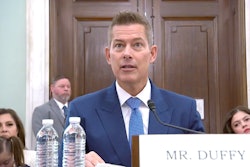Trucking news and briefs for Friday, Jan. 17, 2025:
Coalition of groups urges Trump admin to ditch speed limiter rulemaking
More than a dozen associations on Thursday penned a letter to President-elect Donald Trump, asking that he abandon the Federal Motor Carrier Safety Administration’s rulemaking to mandate speed limiters on heavy-duty trucks.
The coalition consists of the Owner-Operator Independent Drivers Association, National Association of Small Trucking Companies, Western States Trucking Association, North American Punjabi Trucking Association, Mid-West Truckers Association and others.
The letter asks that Trump “take deregulatory action by indefinitely postponing, and ultimately rescinding the … proposed mandate for speed limiters on all heavy-duty commercial motor vehicles.”
The associations said such a mandate “will be bad for road safety, driver retention, and supply chain performance.”
The letter points to the effort's origins in 2016 during the Obama Administration. “Upon assuming office in 2017, your Administration wisely removed this rulemaking from its regulatory agenda and took no further action," the groups said. "Unfortunately, in May 2022, FMCSA revived this mandate with a new Notice of Proposed Rulemaking, again proposing to limit heavy-duty CMVs to a single speed.”

This time, the group is asking that the Trump administration fully rescind the proposal rather than just shelving it.
The coalition claimed that a speed limiter mandate would:
- Create dangerous speed differentials between CMVs and other cars.
- Make it more difficult for businesses to attract and retain professional drivers.
- Slow freight movement across the country.
“In short, this mandate will be harmful for America’s truckers and small businesses, and it will be counterproductive to improving roadway safety,” the coalition said. “As you consider deregulatory action for your initial days in office, our coalition believes that stopping this mandate would be an ideal way to start.”
[Related: Regulatory update: AEBs, speed limiters, more expected in 2025]
Truck driver involved in grisly human smuggling attempt pleads guilty
The driver of the tractor-trailer that in 2022 was used to smuggle at least 64 undocumented individuals, resulting in the deaths of 47 adults and six children, pleaded guilty Thursday, Jan. 16, to multiple counts arising from the fatal incident.
According to court documents, Homero Zamorano Jr., 48, of Elkhart, Texas, pleaded guilty to one count of conspiracy to transport aliens resulting in death, causing serious bodily injury, and placing lives in jeopardy; one count of transportation of aliens resulting in death; and one count of transportation of aliens resulting in serious bodily injury and placing lives in jeopardy.
Reporting at the time of the incident indicated that several dozen migrants were found dead in an abandoned tractor-trailer near Lackland Air Force Base in San Antonio, Texas, in June 2022. The trailer appeared to have a refrigeration unit, but it was not working. Temperatures in San Antonio the day the discovery was made reached 101 degrees. When Zamorano was found in a nearby field, an unnamed police officer told a local news outlet that the driver “was very high on meth” when arrested.
Zamorano is scheduled to be sentenced on April 24, and faces a maximum penalty of life in prison. A federal district court judge will determine any sentence after considering the U.S. Sentencing Guidelines and other statutory factors.
[Related: 3 arrested in connection with deaths of 51 people in Texas tractor-trailer]
FMCSA moves toward improving safety for women truckers, trainees
An advanced notice of proposed rulemaking (ANPRM) has been sent to the White House’s Office of Management and Budget that would seek information from stakeholders regarding ways in which the Federal Motor Carrier Safety Administration can enhance the physical safety of women truck drivers and trainees and address the negative impacts of workplace sexual harassment.
The ANPRM would also seek information about ways in which FMCSA can enhance the safety of vulnerable road users, such as pedestrians and bicyclists.
Typically, OMB has up to 90 days to review rulemakings, but that review period can be extended indefinitely by the head of the rulemaking agency, or the OMB director can extend the review period by up to 30 days.
The ANPRM will be the first step in potentially adding additional curriculum and training provider requirements to FMCSA’s entry-level driver training regulations.














